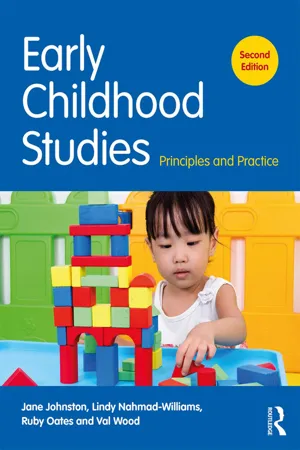
Early Childhood Studies
Principles and Practice
- 574 pages
- English
- ePUB (mobile friendly)
- Available on iOS & Android
Early Childhood Studies
Principles and Practice
About this book
This fully updated new edition offers a comprehensive, accessible, yet rigorous introduction to the study of Early Childhood that will will add value to any Early Childhood Studies course at both foundation and degree level. Addressing both care and education in the Early Years, the book considers a range of multi-disciplinary aspects of Early Childhood; including health, social, educational, psychological and sociological perspectives.
Early Childhood Studies engages the reader by providing real-world examples that underpin theoretical perspectives and bring examples to life, while encouraging practitioners to engage in reflective practice by considering their own similar experiences.
Key features include:
- Engaging activities and case studies that bring theory to life
- Cutting-edge research
- Practical tasks and advice with points for further reading
- End of chapter summaries, Reflective Tasks and Study Skills boxes in each chapter
- Full colour illustrations throughout
This core introductory textbook is an indispensable resource for Early Years' students and professionals, whatever their level of expertise or experience.
Tools to learn more effectively

Saving Books

Keyword Search

Annotating Text

Listen to it instead
Information
Part 1
History and Philosophy of Early Childhood Studies
Chapter 1
Theories and Theorists
Introduction
- → To provide an overview of historical practice and provision in the early years through the work of early pioneers and reformers
- → To provide key biographical details of the lives of these pioneers and reformers, in an attempt to understand the influences on them that have helped to formulate their beliefs
- → To examine the key historical beliefs held by these pioneers and reformers and consider their influence on current practices and policy in early childhood education and care
- → To consider recent, new and emerging theories and theorists emphasising the current issues in Early Childhood Studies, both nationally and internationally
A timeline of theorists
| Rousseau, J.J. | (1712-1778) |
| Pestalozzi, J.H. | (1746-1827) |
| Oberlin, J.F. | (1740-1826) |
| Froebel, F. | (1782-1852) |
| Dewey, J. | (1859-1952) |
| Montessori, M. | (1870-1952) |
| McMillan, R. | (1859-1917) |
| McMillan, M. | (1860-1931) |
| Steiner, R. | (1861-1925) |
| Freud, S. | (1856-1939) |
| Piaget, J. | (1896-1980) |
| Vygotsky, L.S. | (1896-1934) |
| Erikson, E. | (1902-1994) |
| Skinner, B.F. | (1904-1990) |
| Bowlby, J. | (1907-1990) |
| Maslow, A.H. | (1908-1970) |
| Plowden, B.D. | (1910-2000) |
| Bruner, J. | (1915-2016) |
| Bronfenbrenner, U. | (1917-2005) |
| Malaguzzi, L. | (1920-1994) |
| Bandura, A. | (1925-) |
| Kohlberg, L. | (1927-1987) |
| Weikart, D.P. | (1931-2003) |
Experiential learning
Level 1
- ● finding out for yourself;
- ● being taught something;
- ● learning through your own experience;
- ● thinking through a problem;
- ● being supported by another person (adult or peer);
- ● learning through practical activities;
- ● discussing with others;
- ● learning from a book or the media.
- ● What made it so positive?
- ● Was it experiential?
Level 2
- ● What were the features that made it successful?
- ● How could you have made the experience more experiential?
- ● Would this have made it even more successful? Why?
Level 3
- ● Does it contain aspects of experiential learning?
- ● How can you work with your staff to develop the planning further to enhance children's experiential learning?
- ● Why might this be beneficial to the children?
Table of contents
- Cover
- Title
- Copyright
- Brief contents
- Contents
- Guided tour
- About the authors and contributors
- Acknowledgements
- List of abbreviations
- Introduction
- Part 1 History and philosophy of early childhood studies
- Part 2 Early years development
- Part 3 Early childhood
- Part 4 Practitioners in early childhood
- Glossary
- Index
Frequently asked questions
- Essential is ideal for learners and professionals who enjoy exploring a wide range of subjects. Access the Essential Library with 800,000+ trusted titles and best-sellers across business, personal growth, and the humanities. Includes unlimited reading time and Standard Read Aloud voice.
- Complete: Perfect for advanced learners and researchers needing full, unrestricted access. Unlock 1.4M+ books across hundreds of subjects, including academic and specialized titles. The Complete Plan also includes advanced features like Premium Read Aloud and Research Assistant.
Please note we cannot support devices running on iOS 13 and Android 7 or earlier. Learn more about using the app